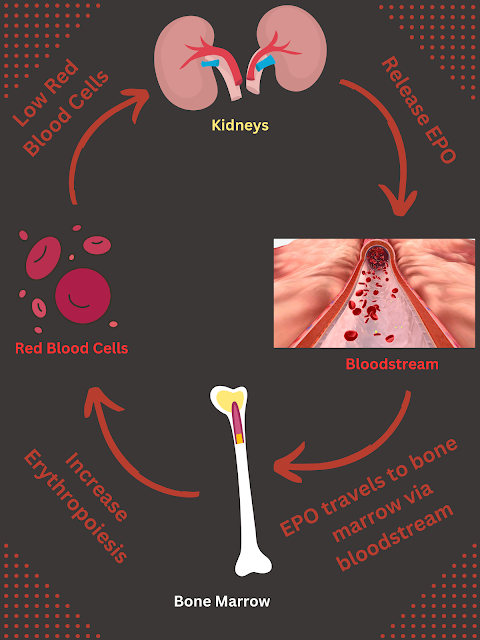Photo by Dr. Haus
Erythropoietin (EPO)
Erythropoietin, called EPO for short, is a hormone that is released by the kidneys that tells the bone marrow to increase erythropoiesis. Erythropoiesis is the production of new red blood cells and this occurs in the bone marrow of the body.
The steps of the release of EPO is written out below and followed by an infographic:
- The kidneys sense less oxygen arriving to the kidneys in the bloodstream
- The kidneys release EPO from the peritubular cells
- The EPO travels in the bloodstream to the bone marrow
- The EPO signals the bone marrow to increase the rate of erythropoiesis
- The bone marrow increase red blood cell synthesis
- Once the oxygen levels in the bloodstream increase the amount of oxygen arriving in the bloodstream to the kidneys goes back to normal and the peritubular cells stop releasing EPO
Why is Erythropoietin Important?
EPO is extremely important because it allows the body to have the correct amount of red blood cells. The red blood cells are needed to bring oxygen to all the cells of the body to keep them alive. Having too few (or too many) red blood cells is detrimental to the body.
As an aside, athletes can "dope" their blood with EPO (think Lance Armstrong here). When athletes take EPO as a performance enhancement drug, they are increasing the number of red blood cells in their body which allows them to bring more oxygen to the cells of their body. This allows these athletes to have more oxygen allowing them to fatigue less quickly. This is obviously not legal and is cheating.
Now, you may also know that many athletes try to train at higher altitudes. This is a strategic decision because at higher altitudes there is less oxygen in the air. Due to this, people and animals that live at higher altitudes have more red blood cells in their body as their kidneys respond to having less oxygen in their system than a(n) person/animal at a lower altitude. This is one way athletes strengthen their bodies for competition. If you are working as a medical professional at a higher altitude it is important to know that the hematocrit (volume of red blood cells in the bloodstream) of patients at higher altitudes should be higher than at lower altitudes.
It is also unhealthy to have too many red blood cells in the bloodstream and this is called polycythemia. This is dangerous because the blood becomes thicker, think sludge flowing through your body. This puts a patient at risk for a blood clot, a fatal condition where blood flow is blocked causing no oxygen or nutrients from arriving to the body.




No comments:
Post a Comment